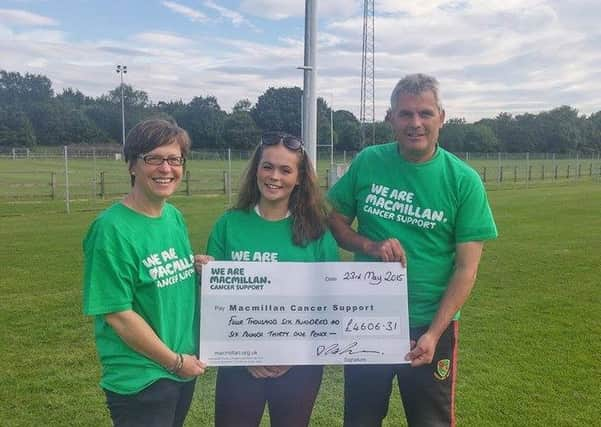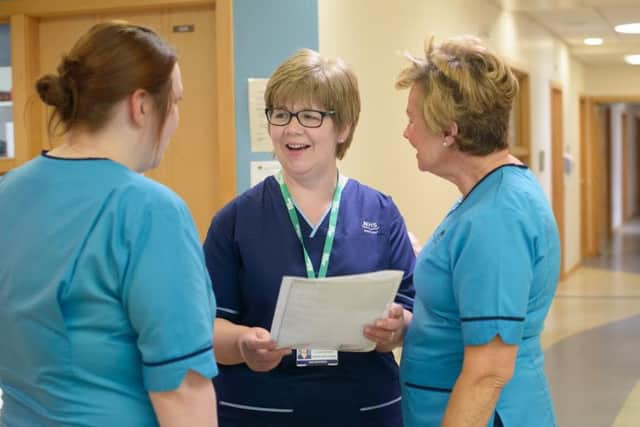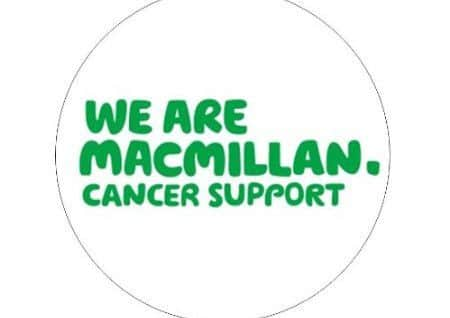Charity in Focus: Macmillan Cancer


About Macmillan
When Douglas Macmillan set up the charity more than 100 years ago, he wanted advice and information to be provided to all people with cancer, homes for patients at low or no cost, and voluntary nurses to attend to patients in their own homes.
Today much of his legacy lives on with the charity acting as a source of support for people living with cancer and a force for improving cancer care.


Advertisement
Hide AdAdvertisement
Hide AdWith nearly one in two people projected to be diagnosed with cancer in their lifetimes, the need for Macmillan’s work is set to increase dramatically and with 220,000 people living with cancer in Scotland, Macmillan lead the forefront in continuing to providing vital services and support.
Donations making up 98 per cent of the charity’s income, so events like the World’s Biggest Coffee Morning are massively important to the charity as they help to raise vital funds.
Macmillan coffee morning has become one of the biggest charity events across the UK.
“The World’s Biggest Coffee Morning” came about after a local fundraising committee held a coffee morning and donated the proceeds to Macmillan. They suggested rolling out the idea nationally and the first official event in 1991 saw 2,600 people across the UK host one.


Today the idea remains faithful to its roots: get together with friends, colleagues or neighbours to hold a coffee morning and raise money for Macmillan. Last year Macmillan estimates that over 5 million people were involved and a total of £138million has been raised since 1991. This year the charity is hoping to raise £30m from the event, beating last year’s total of £25m.
Charity Work
One of Macmillan’s main aims is that no one should face cancer alone and in 2014 the charity spent £7m on funding new services for cancer patients in Scotland.
Macmillan funds a range of professionals to provide support both during and after cancer. The charity is best-known for its Macmillan nurses and across Scotland it funds 345 nurses specialising in everything from breast and lung cancer to palliative and community care. In addition to this, the charity funds a further 223 posts covering everything from GPs, pharmacists and occupational therapists to lecturers, information and support nurses and benefits advisors.
Many people affected by cancer in Scotland experience significant levels of poverty as a direct result of a cancer diagnosis. Financial concerns have been highlighted as a considerable cause of stress for people living with cancer, second only to physical pain. Many people affected by cancer in Scotland don’t get the financial support that they are entitled to, and the take up of benefits amongst terminally ill people is the lowest in the UK.
Advertisement
Hide AdAdvertisement
Hide AdTo respond to this need Macmillan has developed benefits and financial advice services throughout Scotland, in partnership with the NHS, local government and other voluntary sector organisations.
In 2014 Macmillan’s benefits services helped over 13,000 cancer patients and their families claim more than £37m – much of which would have gone unclaimed without the specialist support of our teams as well as giving out over £1.5m in grants to 4700 cancer patients in Scotland struggling with money worries to help them pay fuel bills, buy clothing and cover the costs for travelling to and from hospital.
The charity also funds the Macmillan Support Line, a helpline for people affected by cancer. The free phone number is answered by specialist cancer nurses who provide callers with up-to-date information about specific cancers and treatments, give benefits advice, listen to their concerns and provide emotional support and direct them to support in their area.
The charity is also working on its Move More campaign. The charity has carried out extensive research which has shown that being active during and after treatment is both safe and hugely beneficial. In Scotland, Macmillan is working in partnership with local authorities to offer four 12-week programmes of activity – gardening, walks, gentle movement and group activity. Programmes are already being delivered in Glasgow, Dundee, Fife and Aberdeen with Edinburgh and the Borders soon to follow.
In 2013, research by Macmillan found that 20 per cent of the 29,000 newly diagnosed cancer patients in Scotland lacked support from family and friends during their treatment and recovery and a fifth of those, or four per cent, received no help whatsoever, facing cancer completely alone.
The Macmillan Supporters service pairs head and neck cancer patients with a trained volunteer who has had a similar diagnosis and has completed treatment. The volunteer provides one-to-one telephone support to the person affected by cancer, covering the many issues arising from treatment, including diet, pain, infection, speech problems and the long-term after-effects of treatment.
People they’ve helped
Patient David Carson, 50, had his appendix removed last year after suffering from suspected appendicitis, he was shocked to be told he had cancer. However the father-of-two, from Tomatin near Inverness, immediately picked himself up and underwent six sessions of chemotherapy over 24 weeks. Despite suffering from side-effects of the treatment, including numbness in his feet and legs, David’s priority after being given the all clear was to raise money for Macmillan Cancer Support to ensure other people had access to the same level of care he had experienced.
“I wanted to say thank you to all the staff in the Macmillan suite where I had my chemo,” he says. “Nothing was ever a problem. You just had to make a phone call and there was always someone there to see you. The nurses also spoke to the kids a lot. They were just great. It’s not a nice experience but it was made an awful lot better than it could have been.”
Advertisement
Hide AdAdvertisement
Hide AdThe Highland Rugby Football Club coach decided to hold a touch rugby tournament, with the help of his wife Karen and children Callum, 19, and Becky, 16, and raised more than £4600 for Macmillan.
People who work with them
Nurse Flora Watson is the Senior Charge Nurse at Roxburghe House (Specialist Palliative Care Unit) in Aberdeen.
“My job is to help people achieve their individual goals, which can vary from staying well enough to remain at home or getting to a concert or football game. Everyone’s goals are different and it’s my job to support people with the decisions they choose to make. A big part of that is giving people confidence and just spending time chatting things through with patients and their families.
“A patient recently told me that she wasn’t sure how a nurse could help but just a couple of hours with her Macmillan nurse made her and her husband realise how vital that support is. I am often told how skilled Macmillan nurses are at helping people to open up and share their thoughts and concerns and I know these conversations make a huge difference at a very difficult time for patients and their families.
“While my previous nursing experience helps me hugely in this role I also need to keep updating my skills and developing my knowledge and expertise. Cancer and its treatment is continually developing so it’s essential that I do too. Macmillan has funded education for me throughout my career to allow me to do this. I am currently doing a Clinical Doctorate (Nursing) at Stirling University, which is being funded by Macmillan.”
Volunteer Shona MacKenzie’s mother was diagnosed with cancer she and her father struggled to juggle her care with their full-time jobs. The child-minder, who was just 21 at the time, had to rely on the support of friends to go in and check on her mum during the day.
Now, more than 20 years later, Shona, from Livingston, works as a volunteer with Macmillan Cancer Support’s Helping Matters service which provides practical and emotional support to people affected by cancer.
“Volunteering for Macmillan has helped me personally,” she says. “It’s been healing in a way. It’s let me go out and help people as best I can and just be grateful for the time I had with my mum. I am glad I can help others and give something back.”